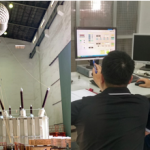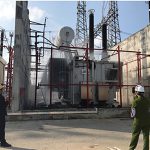Nguyen, Hoang Anh- Energy Economics, Demand Forescast and DSM dept., Institute of Energy
After several months of implementations, the study on Benchmarking tool for energy saving measures in the industrial sub-sectors has been fully completed on-time by Institute of Energy (IEVN) and was approved by the Ministry of Industry and Trade (MOIT).
The study focuses on evaluating and ranking the energy saving measures proposed for energy intensive industries. These measures have been dentified in the energy consumption studies chaired by MOIT and the World Bank. Furthermore, during the implementation, the study team collected energy audit reports of energy intensive industries in the period of 2011-2018.
 Process of the study
Process of the study
Besides, a benchmarking tool was developed in the Microsoft Excel platform named “IE-E2MACC” to present the outcome of the study. This tool points out the priority order for energy saving measures by showing a maginal abatement cost curve (MACC) and CO2 emission reduction within the industry sub-sectors.
The study analysed and evaluated 5 intensive sub-industries with 17 different products, including Beverage, Textile, Paper, Steel and Cement. According to this, the total final energy consumption of these sub-sectors was about 10.8 TOE in 2016. The energy demand is expected to reach 17.1 MTOE and 26.8 MTOE in 2025 and 2030 respectively.
The BAU carbon emision, including the amount from power generation, are estimated to increase from 57.7 million tons of CO2 emissions (MTCO2) in 2016 and increases to 89.2 MTCO2 and 143.2 MTCO2 in 2020 and 2030 respectively.

IE-E2MACC components
The tool IE-E2MACC shows that the weighted average of sub-sectors is in the range of -2USD/GJ to 2USD/GJ. The smallest, as the most attractive average cost are Cement, Fiber, Textile, non-Carbonnated beverage, medium-sized Beer and Dyeing industrial which have a negative value. Meanwhile, the steel and cast iron sectors have positive weighted average.
The investment cost for all the measures was estimated of 35.1 and 96.9 trillion of VND in 2020 and 2030 respectively. Energy saving solutions in 2020 may contribute to saving fuel costs of about 8.2 trillion VND/year and about 34.9 trillion VND in 2030.
Combining all these sub-sectors, the total CO2 emission reduction will be 4.97 million tons and 15.17 million tons in 2020 and 2030 respectively. Implementing the proposed energy saving measures will help to reduce the growth rate of CO2 emission from 6.7% /year to 5.9%/year in the period of 2016-2030.







